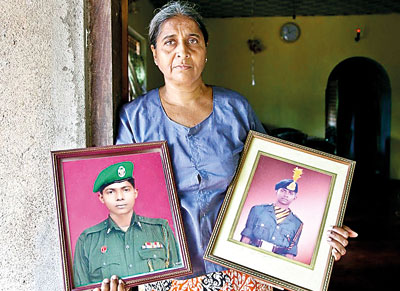‘Her Stories’ come back to Colombo
After touring Ampara, Galle and Jaffna, the ‘Her Stories’ exhibition returns to Colombo this week. In the exhibition are 60 of the 220 stories that were collected fromTamil, Sinhala and Muslim mothers from across the country in Moneragala and Kurunegala, Vavuniya, Mullaitivu and Kilinochchi. In each narrative the women trace the arc of their lives so far – talking about their experiences during the war and the price their families paid but also their hopes for the future and their meditations on what it might hold.

In an interview carried in the Sunday Times when the exhibition first opened, curator Radhika Hettiarachchi said her decision to focus on mothers was rooted in her observation that their narratives had a certain generosity, stretching to encompass their families and communities.
Choosing to preserve each in its original form- in the “voices of those that lived it”- meant that she could add to the tradition of oral storytelling that is such an intrinsic part of Sri Lankan culture. A freelance developmental practitioner, Radhika stepped over the parameters of her work by engaging with these women’s lives outside the projects she was focused on. (Her initiative has since got her nominated for an N-Peace award.) She wanted very much to take it outside Colombo, to some of the areas where she had worked and is pleased to have succeeded in visiting three.
Radhika will still receive the odd call from one of her mothers. More often than not they want to know what people have thought of the exhibition. Radhika is pleased to able to tell them the response has been good, that audiences from all parts of the country have come and marvelled at their resilience and courage. Some visitors have gone on record, writing in the guest book that has been travelling with the exhibition.
Radhika says these responses have completed the circle in a sense, becoming integral to the work she hopes this exhibition will do – remind us that there are stories that go unheard, that there are experiences common to mothers across this country and in its own quiet way contribute to the dialogue on reconciliation.
Her only regret so far is that many of the women who are featured have only seen their piece and not what the others submitted, but funds didn’t allow them to visit every area.
Preserving the narratives in their original form has meant the exhibition is a multi-lingual experience. However, the archive available at www.herstories.org online is currently only in English. This is something Radhika is in the process of remedying, but the going is slow.
The exhibition embraces a multitude of formats: some are handwritten letters the women have addressed to family members who have passed away or left home, others to their children; some are to old pen pals, and some to Radhika herself. Then there are the photo essays by Sharni Jayawardena, the short videos filmed by November Productions and edited by Radhika and the results of the mapping and visual story-telling exercises. The ‘Trees of Life’ in the latter allow for a multi-faceted record, allowing the women to talk about their hopes and dreams, their personal history and life experiences and even the things they most feel gratitude for.
After the exhibition at the International Centre for Ethnic Studies (ICES), Radhika hopes to find funding to take the exhibition to Kandy but the eventual plan is to have the collection end up at the National Archives. It will be among the first archives in there to be dedicated solely to women and to present a collection of oral history recordings of “ordinary citizens telling extraordinary stories”. Explaining that the originals will also all be a part of the National Archives exhibit, Radhika says “I think it’s a great thing, that these will stay on for posterity; that they will be there for future generations to see.”
‘Her Stories’ will be on in Colombo from July 25 – 28 at the ICES Auditorium, 2 Kynsey Terrace, Colombo 8 from 10 a.m. to 5 p.m. Collaborators on the project include the organisation Viluthu, Sharni Jayawardena and November Productions. Find them online by visiting www.herstoryarchive.org and on Facebook by searching for ‘Herstories Archives’.
Follow @timesonlinelk
comments powered by Disqus


